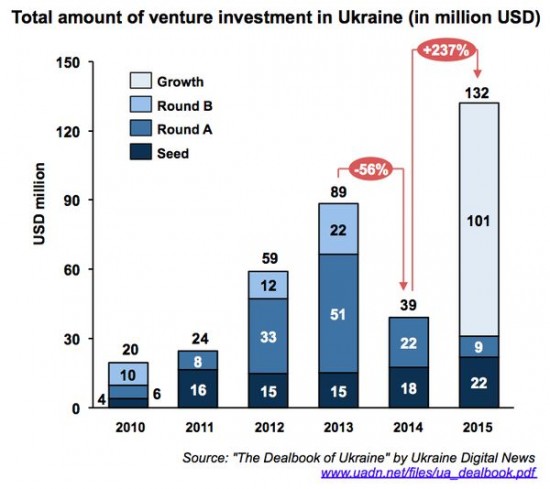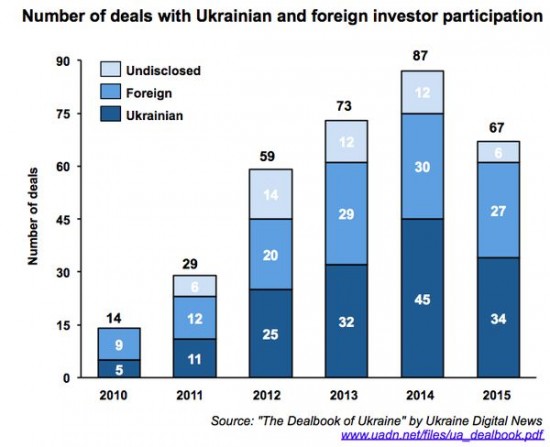Report: Ukraine’s Venture Market Resumes Growth; Local Startups Targeted by Global Tech Giants
Ukraine Digital News and AVentures Capital released today the 2016 edition of “The Deal Book of Ukraine” – an in-depth report on the emerging Ukrainian venture and startup industry.
Made available in English, this 120-page study features more than 180 deals that were made public or identified in 2014 and 2015.
Among the most spectacular events of this period was Snapchat’s acquisition of Looksery, a Ukraine-originated startup which developed augmented reality filters for selfies. The deal amounted to some $150 million, according to industry sources.
Other notable acquisitions of 2015 include those of Ericpol by Ericsson, Maxymiser by Oracle, and Jeapie by Canada’s Mobify, all for undisclosed amounts.
According to the report, – putting aside such acquisitions – the tech investment market reached $132 million in total volume in 2015.
While the performance looks modest in comparison with advanced European countries, it is impressive for Ukraine. This very young market demonstrated a 240% growth compared with the year before, when the market shortened by over 55% amid the political and economic crisis.
The recent growth was mainly the result of three large growth-stage deals, while early-stage investments slightly decreased. Among notable new growth-stage investors was George Soros, who promised to commit $1 billion to Ukraine, with the tech sector figuring on his priority investment list.


“Amid the country’s current political and economic woes, the Ukrainian startup and venture scene is experiencing an astonishing revival,”
notes Adrien Henni, chief editor at Ukrainian Digital News and co-author of the report.
“We are witnessing the emergence of a new generation of globally-oriented startups, the entry of new classes of investors into the market, and the blossoming of community initiatives – from brand-new industry associations, to educational institutions and media platforms.”
Over the years, the intellectual products and software developed by Ukrainian technical talent has been absorbed internationally, mostly in American and European markets, notes lead author Yevgen Sysoyev, founding and managing partner at AVentures Capital.
“Famous Ukrainians who left Ukraine and built multibillion-dollar startups in the Silicon Valley include Jan Koum (WhatsApp), Max Levchin (PayPal) and many others. Those Ukrainian entrepreneurs who stayed in Ukraine have grown in ambition and skill, building many successful global businesses such as InvisibleCRM, Jooble and Depositphotos, to name a few. The day when we will hear of the first billion-dollar IPO or exit of a Ukrainian IT startup is coming soon,”
Sysoyev believes.
Also included in the report are the stories of a dozen tech entrepreneurs and investors, which reveal the effort made by a new generation of Ukrainian businessmen to build world-class tech companies – sometimes very successfully.
For many of them, however, developing startups or investing in them goes beyond technological excitement or the appeal of quick and big money.
“Our interviews with these entrepreneurs and investors show their willingness to build a new nation. In their minds, technology shines as a promise for highly-skilled and well-paid jobs for the new and the next generations, and for the country’s stronger integration into the global economy,”
notes Henni.
The report enjoys the support of industry associations UAngel and UVCA, venture fund FISON, the Kyiv Post, and many other organizations.
KEY FINDINGS
- After a short-lived decline in 2014, the Ukrainian IT sector demonstrated record growth in 2015. Not only did the market regain its strength, it significantly exceeded the activity level of any previous year, according to UADN’s report.
- The investment market reached an unprecedented $132 million in total volume in 2015, demonstrating a 240% growth from the year before, when the market shortened by over 55%.
- The growth of investment volume in 2015 was mainly the result of three large-growth stage deals, while early-stage investments slightly decreased.
- Startups oriented to the local market are likely to continue facing difficulties connected with the contraction of the Ukrainian economy and its currency fluctuations. However, there are also a number of winners that profit from such market conditions, including leading e-commerce players.
- Globally-oriented startups attracted more investments in 2015. Many of the teams have moved to their primary product markets, raised follow-on funding from international sources, and kept their R&D teams in Ukraine.
- Foreign investors kept interest in the Ukrainian tech sector, making or leading more than 40% of the deals in 2015.
- In 2015, Ukraine saw the trend of well-known foreign companies acquiring domestic startups, offering global products, continue. The year’s largest acquisition was that of the Looksery image-processing app by Snapchat for a reported $150 million.
- Growth-stage deals emerged as a new transaction class, accounting for $100 million of the total investment volume. Among notable new growth-stage investors was George Soros, who promised to commit $1 billion to Ukraine, with the tech sector figuring on his priority investment list.
- The 2014-2015 period was marked by a government push for reforms. The IT sector played a major role in the design and implementation of some of the most widely recognized and successful reforms, including those addressing deregulation and e-government.
To download your free copy of the report, please click here. For any question, feel free to reach co-author Adrien Henni at editor[at]ewdn.com
Source: Ukraine Digital News


